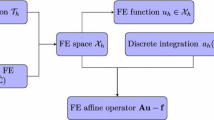Abstract
Multigrid and domain-decomposition methods are now widely used in large-scale simulation studies. Meanwhile, many types of preconditioners are available for speeding the convergence. Users of analysis models are interested in the method or preconditioner that minimizes the computing time. In this paper, we analyze a thermal problem and a solid problem using two free, open-source software programs—the UG4 framework and the ADVENTURE system—based on geometric multigrid (GM) solvers and balancing domain-decomposition (BDD) solvers. We examine and report the computing times and iteration numbers to convergence of the two programs, and generate a common software interface between the UG4 framework and ADVENTURE system. Through this software interface, we can compare the solvers of the two software systems using the same mesh data. The results were presented on the CX400 system at the Information Technology Center of Nagoya University, Japan. The convergence rate of GM solver improved after suitable smoothing and scaling to finer grids. The BDD solver is suitable for large-scale analyses of structures with detailed and complex geometries.












Similar content being viewed by others
References
Hackbusch, W.: Multi-grid Methods and Applications, vol. 4. Springer, Berlin (1985)
Glowinski, R., Dinh, Q.V., Periaux, J.: Domain decomposition method for nonlinear problems in fluid dynamics. Comput. Methods Appl. Mech. Eng. 40, 27–109 (1983)
Quarteroni, A., Vali, A.: Domain Decomposition Methods for Partial Differential Equations. Clarendon Press, Oxford (1999)
Bergen, B., Gradl, T., Rude, U., Hulsemann, F.: A massively parallel multigrid method for finite elements. Comput. Sci. Eng. 8(6), 56–62 (2006)
Sampath, R., Biros, G.: A parallel geometric multigrid method for finite elements on octree meshes. SIAM J. Sci. Comput. 32, 1361–1392 (2010)
Sundar, H., Biros, G., Burstedde, C., Rudi, J., Ghattas, O., Stadler, G., Parallel geometric-algebraic multigrid on unstructured forests of octrees. In: Proceedings of the International Conference on High Performance Computing, Networking, Storage and Analysis, SC12, pp. 43:1–43:11. IEEE Computer Society Press, Los Alamitos, CA, USA (2012)
Home page of UG4 framework. http://gcsc.uni-frankfurt.de/simulation-and-modelling/ug4
Reiter, S., Vogel, A., Heppner, I., Rupp, M., Wittum, G.: A massively parallel geometric multigrid solver on hierarchically distributed grids. Comput. Vis. Sci. 16(4), 151–164 (2013)
Vogel, A., Reiter, S., Rupp, M., Nägel, A., Wittum, G.: UG4—a novel flexible software system for simulating PDE based models on high performance computers. Comput. Vis. Sci. 16(4), 165–179 (2013)
Yagawa, G., Shioya, R.: Parallel finite elements on a massively parallel computer with domain decomposition. Comput. Syst. Eng. 4, 495–503 (1994)
Mandel, J., Brezina, M.: Balancing domain decomposition for problems with large jumps in coefficients. Math. Comput. 65(216), 1387–1401 (1996)
Home page of ADVENTURE system. http://adventure.sys.t.u-tokyo.ac.jp
Yoshimura, S., Shioya, R., Noguchi, H., Miyamura, T.: Advanced general-purpose computational mechanics system for large scale analysis and design. J. Comput. Appl. Math. 149, 279–296 (2002)
Yoshimura, S., Kobayashi, K., Akiba, H., Suzuki, S., Ogino, M.: Seismic response analysis of full-scale boiling water reactor using three-dimensional finite element method. Trans. At. Energy Soc. Jpn. 11(3), 203–221 (2012)
Miyamura, T., Akiba, H., Hori, M.: Large-scale seismic response analysis of super-high-rise steel building considering soil-structure interaction using K computer. Int. J. High-Rise Build. 4(1), 75–83 (2015)
Shioya, R., Ogino, M., Kanayama, H., Tagami, D.: Large scale finite element analysis with a balancing domain decomposition method. Key Eng. Mater. 253–244, 21–26 (2003)
Shioya, R., Kanayama, H., Mukaddes, A.M.M., Ogino, M.: Heat conductive analysis with balancing domain decomposition method. Theor. Appl. Mech. 52, 43–53 (2003)
Kawai, H., Ogino, M., Shioya, R., Yoshimura, S.: Performance evaluation of ADVENTURE on K computer. MI Lect. Note Ser. 45, 83–97 (2013)
Home page of Promesh software. http://promesh3d.com
Acknowledgements
This research is financially supported by one of Japan Science and Technology (JST), CREST projects and the German Research Foundation (DFG). The CREST projects named “Development of Numerical Library Based on Hierarchical Domain Decomposition for Postpeta Scale Simulation”.
Author information
Authors and Affiliations
Corresponding author
Additional information
Communicated by Babett Lemke.
Publisher's Note
Springer Nature remains neutral with regard to jurisdictional claims in published maps and institutional affiliations.
Rights and permissions
About this article
Cite this article
Zheng, H., Shioya, R., Kawai, H. et al. Performance comparisons of geometric multigrid solvers and balancing domain decomposition solvers. Comput. Visual Sci. 23, 5 (2020). https://doi.org/10.1007/s00791-020-00323-4
Received:
Accepted:
Published:
DOI: https://doi.org/10.1007/s00791-020-00323-4



